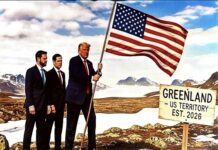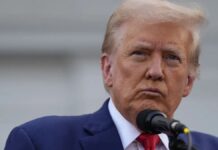While administration and campaign officials have said they don’t believe setting the speech at the White House presents ethical problems, they are nevertheless gauging the public reaction to reports about it closely. Some of the pushback could come from senior members of the President’s own party.
“Is that even legal?” Senate Republican Whip John Thune said of the idea. “I assume that’s not something that you could do … I think anything to do with federal property would seem to me to be problematic.”
A source close to the campaign said there has been some concern about the negative reaction, but the White House remains the most likely — and most convenient — venue for Trump’s speech.
Trump would not be the first president to use the trappings of the White House in a reelection bid. But previous administrations went to painstaking lengths to give the illusion of separation between the campaign and the White House. And past presidents have delivered speeches at the White House imbued with a political motive, they have largely couched those in policy and presidential action. But giving an acceptance speech on the eve of receiving their party’s nomination for President is among the most politically charged appearances any candidate makes in the course of an election, and Trump’s will be his highest-profile speech in the campaign to date.
Campaign aides and advisers have acknowledged jitters about the norm-breaking idea of setting such a moment against the backdrop of the storied residence, but this is not a presidency known for perpetuating the norm.
Since taking office in 2017, Trump has increasingly blurred the line between political and official events and has unabashedly made campaigning a feature of his presidency. The only President to file for reelection the day he took office, Trump held his first campaign rally just one month into his tenure.
Beyond the surge in coronavirus cases that has made returning to the campaign trail in any meaningful way challenging for all candidates, Trump’s team is still reeling from the embarrassment in June of an empty arena in Tulsa. Campaign aides have been gun-shy about reviving rallies or events resembling them since attendance at the Oklahoma rally — his first campaign appearance since before the pandemic hit — fell far short of expectations and local officials blamed the event in part for a rise in local infection rates.
Now, the once-blurred line between campaigning and governing seems to have all but disappeared, with official White House events replacing the rallies that Trump craves.
“This is always a delicate balance for any sitting president,” said Anita McBride, the executive-in-residence at the Center for Congressional and Presidential Studies at American University. “There is more scrutiny and every action is could be looked at through a political lens.”
Last month, Trump broke protocol when he turned a Rose Garden event meant to focus on the White House China policy, into a diatribe against his opponent Joe Biden.
“Joe Biden gave a speech in which he said that the core of his economic agenda is a hard-left crusade against American energy. He wants to kill American energy,” the President said, during a string of attacks against the former vice president.
Off-campus, the line is just as murky, with official White House events now blaring the campaign’s eclectic playlist, meant to pump up the rally crowd, ahead of the President’s arrival and the President does not hesitate to inject divisive campaign rhetoric into his ostensibly policy-focused events.
At a Wednesday event in Ohio, Trump signed an executive order on manufacturing in America and slammed Biden on his mental acuity.
“As I was leaving for the great state of Ohio, did you ever watch Biden, where he’s always saying the wrong state. ‘It’s great to be in Florida!’ Florida! No, it’s Ohio. I’ve never seen the guy, I haven’t done that yet, that’s a disaster,” Trump said before departing for a campaign fundraiser.
According to White House aides and campaign officials, none of this is a coincidence. With their goal of getting Trump as much free television airtime as possible, officials have noted that television networks are more likely to carry the President’s speeches live if they are billed as official, not campaign, events.
Aides often timing these “official events” to maximize his exposure to the public, such as scheduling his semi-regular news conferences about Covid-19 in the early evening hours. And they count on the local press in the swing states Trump has placed on his recent travel schedule to amplify his message in areas where he most needs to shore up support.
On a structural level, control of the events is also unclear.
Ahead of Trump’s official White House event at Mount Rushmore, it was a campaign official who sent out the excerpts from his speech.
And when the campaign cancelled the New Hampshire rally due to rally, White House press secretary Kayleigh McEnany informed the press of the decision aboard Air Force One.
When it comes to the convention speech, Trump’s critics have sounded alarms on the legality and protocol the President might be defying if settles on the White House backdrop.
However, legal experts agree that It is legal for the President to accept the nomination from the White House; the President and vice president are exempt from the Hatch Act.
But, McBride, who served as assistant to President George W. Bush and chief of staff to first lady Laura Bush, notes how there could be some potential problems under the law for those federal employees working on the event. The Hatch Act, which was passed in 1939, limits the political activities of federal employees while on duty or in the workplace. Essentially, it prohibits federal employees from engaging in political activities, such as campaigning, in a government building, like the White House.
According to a person familiar with the planning, the Trump campaign and Republican National Committee would pay for the costs of setting up a speech at the White House and any White House officials involved in the planning would be doing so in their personal capacity.
But on questions of norms, McBride called the potential decision for Trump to speech from the residence fair-game: “Joe Biden’s going to do it from his home.”
This and other decisions are subject to Trump’s sign-off, and he is deeply involved. Not since President Bill Clinton hired a Hollywood film executive to produce his campaign events has a president been more attuned to stagecraft.
At the moment, for example, the fate of the Truman Balcony depends in part on pure television considerations — how the participants look upon it in the evening light.












